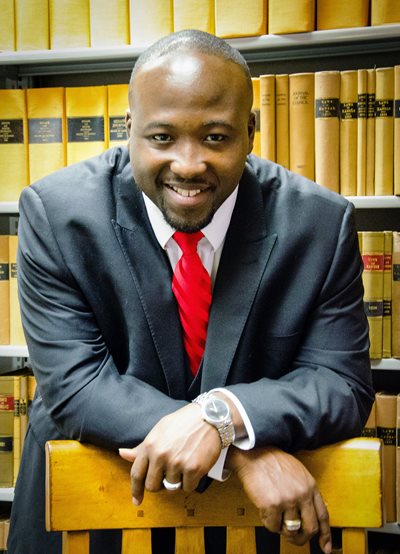When President Donald Trump unveiled his Commission on Law Enforcement and the Administration of Justice in January, he announced it as a task force put together to recommend crime reform measures to the U.S. Department of Justice.
Mark Dupree, the Democratic district attorney of Wyandotte County, Kansas, said the commission remained on that course through its first few months. Then it devolved into political posturing and harmful, status quo crime policies, with many members being shut out of discussions.
Dupree resigned from the commission in a letter to U.S. Attorney General William Barr last week, saying it “has been smothered by a pernicious political agenda.”

In the Nov. 19 letter, Dupree told Barr the commission seemed “intent on exploiting the divisions that exist in the country.” The DA also wrote that he was never shown the commission’s final report, and saw no indications that recommendations would address racial inequities or systemic racism deep seeded in the criminal justice system.
“My hope was that by bringing together a diversity of perspectives and holistic thinkers, this commission would develop a comprehensive set of recommendations that would positively affect the relationship that our citizens have with law enforcement and the criminal justice system at large,” the district attorney wrote. “Unfortunately, that excitement and joy was replaced with disappointment and concern with a process that left too many important voices out and one that completely lacked transparency.”
Durpee became the first Black district attorney ever elected in the state of Kansas when he took office as Wyandotte County’s top prosecutor in 2017. His older brother Timothy Dupree, a district judge in the county, swore him in for his oath of office. Wyandotte County covers the portion of Kansas City west of the Missouri state line.
Dupree was re-elected to his second term in the August primary. He told the Atlanta Black Star he was nominated to join to Trump’s crime commission as one of its leading prosecutors in October 2019. He acknowledged he doesn’t support Trump administration policies, but said he saw it as an opportunity to bring forth some of the reforms he’s instituted in Wyandotte.
“I believed that it was in the best interest to put aside my political differences to create recommendations that would bring about a more just criminal justice system and that would address disparity that we see in this system concerning Black, Brown and broke folks,” he said during a Nov. 24 interview.
In 2018, Dupree created the Conviction Integrity Unit, which reviewed dozens of cases from inmates who claim they’ve been wrongfully convicted. The unit, which was the first in the state, has resulted in the exonerations of two wrongfully convicted men who collectively spent more than three decades behind bars. In June, Dupree’s office also began investigating complaints of excessive force by police officers in the wake of George Floyd’s death.
The prosecutor called those efforts examples of “holistic and evidence-based thinking,” but said the Trump’s commission failed to reckon with any of the inequities in justice system. In his letter to Barr, he worried that the report would “perpetuate the harms of the war on drugs,” which have had damaging effects on communities of color.
“Their recommendations go against the non-traditional thinking such as the Conviction Integrity Unit because they have a thought process where there were no mistakes made concerning convictions in the past,” he told ABS.
There have been 2,692 exonerations across the U.S. since 1989, amounting to over 24,350 years served by men and women wrongfully convicted, according to the National Registry of Exonerations, which has tracked the nation’s exonerations for the past 31 years.
President Trump established the commission through executive order with the goal of studying a number of issues facing law enforcement and developing comprehensive reforms to address them. It was a diverse assembly of law enforcement strains from across the nation. The list of appointees included, sheriffs, police chiefs, retired officers, prosecutors, state attorney generals, top-ranking FBI officials and other federal agents.
The think tank was broken up into 15 different workgroups tasked to focus on things like recruitment and training in the ranks, innovative technologies, crime reduction, intersectionality across the criminal justice system and fostering more respect for law enforcement.
Dupree was assigned to the work group that focused on bolstering re-entry programs to reduce recidivism by giving prisoners more resources to succeed when they’re released from incarceration. But he said the groups stopped collaborating at some point. And in April, he noticed some members were no longer being invited to meetings as the commission put more of an onus on work groups like respect for law enforcement and shifted toward hardline punitive approaches.
In May, Dupree sent commission leaders a memo questioning the lack of transparency he saw in the process. He also took umbrage with perceived attacks on progressive-minded local prosecutors, and asked whether the group was trending toward any real solutions to address the “deep-rooted issues of racial disparity in policing and the growing distrust of the justice system.”
The commission never responded to any of Dupree’s concerns, he said.
Ramsey County, Minnesota, attorney John Choi became the first member to ask that his name be removed from the commission’s report when he resigned in September.
“It is now patently obvious…that this process had no intention of engaging in a thoughtful and open analysis, but was intent on providing cover for a predetermined agenda that ignores the lessons of the past, furthering failed tough-on-crime policies that led to our current mass incarceration crisis and fueling divisions between our communities and our police officers,” Choi wrote in his Sept. 3 letter to Barr, CNN reported.
Dupree worked with Choi to pen his May 29 letter four days after George Floyd was killed by Minneapolis police officers, signaling the intense need for changes.
“The murder of George Floyd said to law enforcement and to prosecutors across this country that what we are doing is not working, and it needs to be fixed,” Dupree said.
Dupree saw drafts from different working groups in September, but nothing to confirm what kinds of recommendations were being included in the final report. He considered resigning at that point, but decided to see the project through.
The last straw for Dupree came last month when U.S. District Court Judge John Bates ruled that the presidential commission violated the Federal Advisory Committee Act, a law that requires a balance of viewpoints for national-level advisory panels, the Kansas City Star reported. Bates originally ordered the commission to stop meeting and banned members from issuing a report until they complied with the law. The courts later determined the commission can issue a report, but only with a disclaimer that the requirements of the federal law weren’t met.
The crime commission has not publicly released a final report. But that was the proof Dupree needed to confirm his suspicions that the commission was not operating in good faith.
“I was hopeful that the work done in my working group…would bring meaningful progress and change,” he wrote. “Unfortunately, that work has been smothered by a pernicious political agenda. Therefore, I am saddened but feel morally and ethically obligated to request that my name be removed from the Commission’s final report and any other documents that it issues.”


